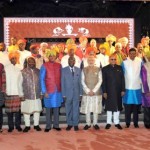Five months after the third India-Africa Forum Summit ended in Delhi, a valid question to examine is: where does this relationship stand now, and where is it heading?
The last week of October 2015 brought Africa to the centre of attention of India’s leadership, public, media, business and strategic community. The historic summit saw participation by 54 African countries, 41 of them at the head of state or government level. Aptly hailed as the largest gathering of African leaders on Indian soil, the summit produced tangible outcomes besides a few memorable speeches. Thereafter, allege critics, Africa began to slip again from India’s radar. This is a flawed perception for known facts present a different story.
New Delhi’s decision to move beyond the “Banjul formula” (under which, only a representative section of about 15 African leaders had attended the first two summits in 2008 and 2011) and to invite all African leaders was a bold one. Through vigorous diplomatic action, an all-inclusive African presence was ensured. This was an achievement in itself.
African leaders came to explore what India could do for them as also to recognise and applaud the nation’s rising profile in global affairs. The outcome documents—“Delhi Declaration” and “Framework for Strategic Partnership”—reflected the common positions of India and Africa on a wide array of political and economic issues. They also articulated a joint commitment to deepen mutual cooperation. Objective analysts declared the summit a success while pointing out that sustained implementation and follow up by both sides would determine the degree of success in the long term.
Two major conferences have taken place in New Delhi in the first quarter of 2016 and advanced the common agenda. The 4th India Africa Hydrocarbons Conference, held in January, brought together all relevant stakeholders in the petroleum and gas sector from 27 African countries and India. According to official sources, they broke “new ground” in mapping contours of collaboration among interested countries. A natural complementarity of interests was established: India needs to benefit from Africa’s coal, oil, and natural gas reserves whereas Africa stands to gain from India’s world-class downstream capabilities.
In a meaningful valedictory address, External Affairs Minister Sushma Swaraj conveyed a solemn, much-needed assurance to African visitors that Indian companies would be “sensitive” towards local concerns and contribute to the development and prosperity of local communities.
On March 14–15, the 11th CII-EXIM Bank Conclave on India- Africa Project Partnership was hosted by the Confederation of Indian Industry (CII) and Exim (Export-Import) Bank. Over 1,000 delegates, including 400 from Africa, attended the inaugural session. The conclave’s role as a bridge-builder has matured well since 2005, when the first conference was organised. Reflecting the viewpoint of India Inc., Noel Tata, a respected business leader, asserted that weaknesses of the global economy were unlikely to disappear soon. He underlined that this justified the need of Indian companies to diversify their customer and investment bases, and pointed to the attractiveness of Africa in this context. African participants spoke about the win-win nature of expanded economic links between the African continent and India. Innumerable B2B meetings were held: they will hopefully result in new business deals and arrangements.
India’s strategic community seems to be doing its bit to advance conversations with Africa. A Delhi-based think tank hosted useful dialogues on specific sectors—health, agriculture, South-South cooperation—in order to showcase the imperatives for closer cooperation between African and Indian role players.
At the Raisina Dialogue, ORF’s new “flagship” international conference involving ministers, officials, and thought leaders, the focus was on connectivity in Asia. However, a session on “Asia@Africa” saw experts from Kenya, South Africa, Senegal, and Mauritius expound their shared belief in heightened cooperation with India. A Vietnamese scholar argued that rising Asia needed Africa’s energy resources whereas Africa needed to acquire the manufacturing prowess of Asia to produce needed goods. He noted there was “considerable competition” within Asia to fulfill Africa’s needs.
A distinguished scholar working with a Mumbai-based think tank emphasised the value of developing Africa’s financial institutions and instruments, suggesting that Indian banks should expand their footprint on the continent. He also highlighted enticing possibilities of cooperation in Africa between Indian companies and their counterparts in the United States, EU and Japan.
On the downside, incidents of ill treatment of Africans in India have been a cause of concern. They demonstrate the need for better understanding and interaction at the civil society level, and for closer engagement between Indian and African media organisations. African countries have a strong diplomatic presence in India, but Africa’s public diplomacy in India needs to be made more effective. African diplomats should consider tapping the existing reservoir of goodwill and activating the large community of Africa’s friends in various Indian cities.
It is expected that India’s top three dignitaries—the president, vice president and prime minister—may visit Africa this year; a senior official predicted that Africa would be “the diplomatic flavour in 2016”. By focusing on a thorough implementation of agreements concluded and commitments made, the governments and other stakeholders on both sides would add substance and momentum to the strategic partnership between India and Africa.
Rajiv Bhatia is Distinguished Fellow, Foreign Policy Studies Programme at Gateway House, former ambassador to Myanmar, and author of ‘India-Myanmar Relations: Changing contours’ (Routledge).
This article was exclusively written for Gateway House: Indian Council on Global Relations. You can read more exclusive content here.
For interview requests with the author, or for permission to republish, please contact outreach@gatewayhouse.in.
© Copyright 2016 Gateway House: Indian Council on Global Relations. All rights reserved. Any unauthorized copying or reproduction is strictly prohibited


